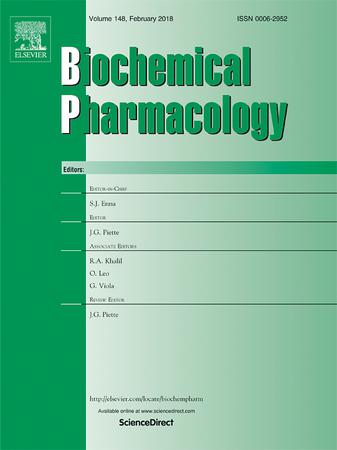丹皮酚增强重组egfr靶向融合蛋白-药物偶联物诱导的食管癌抗肿瘤疗效。
IF 5.3
2区 医学
Q1 PHARMACOLOGY & PHARMACY
引用次数: 0
摘要
食管癌(Esophageal cancer, EC)是一种发病率高、死亡率高、5年生存率低的胃肠道肿瘤,迫切需要发现新的预防和治疗药物。我们前期的研究发现了一种新的egfr靶向融合蛋白-药物偶联物Fv-LDP-D3-AE,对食管癌具有显著的抑制活性。然而,单一疗法的有效性在食管癌治疗的临床转化中仍面临重大挑战。因此,迫切需要寻找一种可与Fv-LDP-D3-AE联用的候选抗肿瘤药物,以提高治疗效果。本研究报告了一种新的丹皮酚与Fv-LDP-D3-AE联合治疗方案,利用人食管癌细胞KYSE70和EC109进行体外研究,并建立BALB/c裸鼠异种移植模型进行体内实验,探讨联合治疗食管癌的抗肿瘤效果和可能的机制。结果表明,联合治疗具有协同作用,可有效抑制食管癌细胞的增殖、迁移和侵袭,诱导更明显的细胞凋亡和DNA损伤,抑制异种移植小鼠模型肿瘤生长,肿瘤抑制率达76%。这可能与联合治疗同时抑制EGFR/AKT/mTOR信号通路和下调核仁蛋白表达有关。综上所述,丹皮酚可与Fv-LDP-D3-AE协同增强抗食管癌的疗效,可能是一种有前景的食管癌治疗策略。本文章由计算机程序翻译,如有差异,请以英文原文为准。

Paeonol enhances a recombinant EGFR-targeted fusion protein-drug conjugate induced antitumor efficacy in esophageal cancer
Esophageal cancer (EC) is a gastrointestinal cancer with high morbidity and mortality, along with a low 5-year survival rate, which urgently requires the discovery of new drugs for prevention and treatment. Our previous studies have found a novel EGFR-targeted fusion protein-drug conjugate, Fv-LDP-D3-AE, which exhibits significant inhibitory activity against esophageal cancer. However, the effectiveness of monotherapy still faces major challenges in clinical translation for esophageal cancer treatment. Therefore, there is an urgent need to identify a candidate anti-tumor drug that can be combined with Fv-LDP-D3-AE to enhance therapeutic efficacy. In this study, we report a novel combination treatment regimen of paeonol with Fv-LDP-D3-AE, using human esophageal cancer cells KYSE70 and EC109 for in vitro studies and establishing a BALB/c nude mouse xenograft model for in vivo experiments to investigate the anti-tumor efficacy and potential mechanisms of the combination therapy in esophageal cancer. The results indicated that the combined treatment emerged a synergistic effect, which could effectively inhibit the proliferation, migration, and invasion of esophageal cancer cells, induce more obvious cell apoptosis and DNA damage, and suppress tumor growth in the xenograft mouse model with a tumor inhibition rate of 76%. This may be attributed to the combination therapy simultaneously inhibiting the EGFR/AKT/mTOR signaling pathway and downregulating the expression of nucleolin. Overall, these findings suggest that paeonol could synergize with Fv-LDP-D3-AE to enhance anti-esophageal cancer efficacy, which may be a promising therapeutic strategy for esophageal cancer.
求助全文
通过发布文献求助,成功后即可免费获取论文全文。
去求助
来源期刊

Biochemical pharmacology
医学-药学
CiteScore
10.30
自引率
1.70%
发文量
420
审稿时长
17 days
期刊介绍:
Biochemical Pharmacology publishes original research findings, Commentaries and review articles related to the elucidation of cellular and tissue function(s) at the biochemical and molecular levels, the modification of cellular phenotype(s) by genetic, transcriptional/translational or drug/compound-induced modifications, as well as the pharmacodynamics and pharmacokinetics of xenobiotics and drugs, the latter including both small molecules and biologics.
The journal''s target audience includes scientists engaged in the identification and study of the mechanisms of action of xenobiotics, biologics and drugs and in the drug discovery and development process.
All areas of cellular biology and cellular, tissue/organ and whole animal pharmacology fall within the scope of the journal. Drug classes covered include anti-infectives, anti-inflammatory agents, chemotherapeutics, cardiovascular, endocrinological, immunological, metabolic, neurological and psychiatric drugs, as well as research on drug metabolism and kinetics. While medicinal chemistry is a topic of complimentary interest, manuscripts in this area must contain sufficient biological data to characterize pharmacologically the compounds reported. Submissions describing work focused predominately on chemical synthesis and molecular modeling will not be considered for review.
While particular emphasis is placed on reporting the results of molecular and biochemical studies, research involving the use of tissue and animal models of human pathophysiology and toxicology is of interest to the extent that it helps define drug mechanisms of action, safety and efficacy.
 求助内容:
求助内容: 应助结果提醒方式:
应助结果提醒方式:


